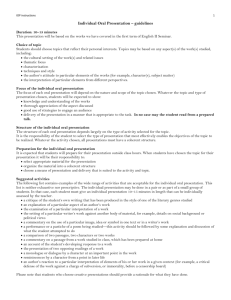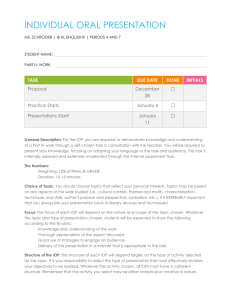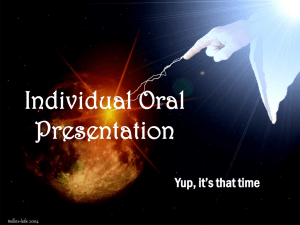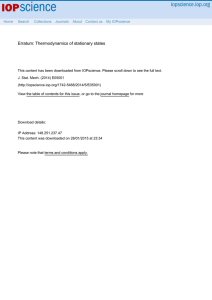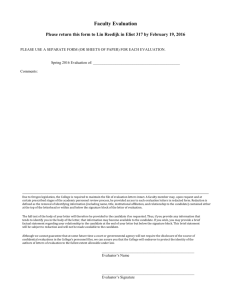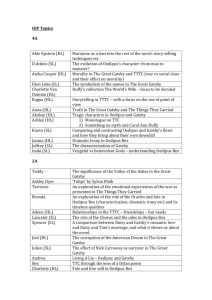Individual Oral Presentation - Denton Independent School District
advertisement
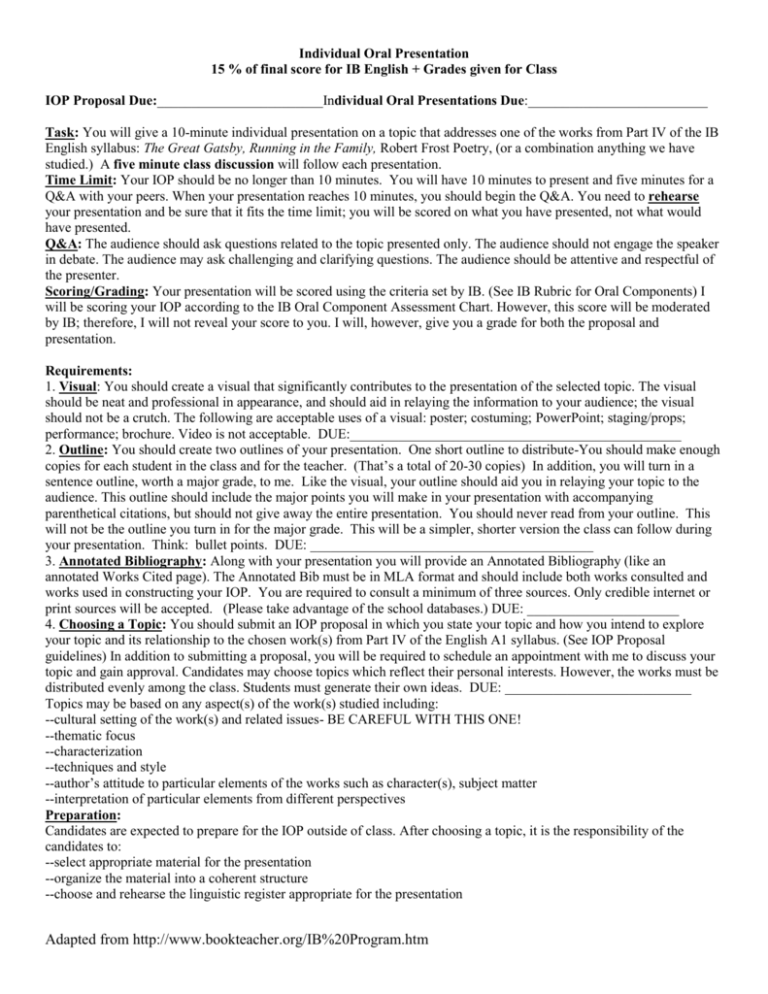
Individual Oral Presentation 15 % of final score for IB English + Grades given for Class IOP Proposal Due:________________________Individual Oral Presentations Due:__________________________ Task: You will give a 10-minute individual presentation on a topic that addresses one of the works from Part IV of the IB English syllabus: The Great Gatsby, Running in the Family, Robert Frost Poetry, (or a combination anything we have studied.) A five minute class discussion will follow each presentation. Time Limit: Your IOP should be no longer than 10 minutes. You will have 10 minutes to present and five minutes for a Q&A with your peers. When your presentation reaches 10 minutes, you should begin the Q&A. You need to rehearse your presentation and be sure that it fits the time limit; you will be scored on what you have presented, not what would have presented. Q&A: The audience should ask questions related to the topic presented only. The audience should not engage the speaker in debate. The audience may ask challenging and clarifying questions. The audience should be attentive and respectful of the presenter. Scoring/Grading: Your presentation will be scored using the criteria set by IB. (See IB Rubric for Oral Components) I will be scoring your IOP according to the IB Oral Component Assessment Chart. However, this score will be moderated by IB; therefore, I will not reveal your score to you. I will, however, give you a grade for both the proposal and presentation. Requirements: 1. Visual: You should create a visual that significantly contributes to the presentation of the selected topic. The visual should be neat and professional in appearance, and should aid in relaying the information to your audience; the visual should not be a crutch. The following are acceptable uses of a visual: poster; costuming; PowerPoint; staging/props; performance; brochure. Video is not acceptable. DUE:________________________________________________ 2. Outline: You should create two outlines of your presentation. One short outline to distribute-You should make enough copies for each student in the class and for the teacher. (That’s a total of 20-30 copies) In addition, you will turn in a sentence outline, worth a major grade, to me. Like the visual, your outline should aid you in relaying your topic to the audience. This outline should include the major points you will make in your presentation with accompanying parenthetical citations, but should not give away the entire presentation. You should never read from your outline. This will not be the outline you turn in for the major grade. This will be a simpler, shorter version the class can follow during your presentation. Think: bullet points. DUE: _________________________________________ 3. Annotated Bibliography: Along with your presentation you will provide an Annotated Bibliography (like an annotated Works Cited page). The Annotated Bib must be in MLA format and should include both works consulted and works used in constructing your IOP. You are required to consult a minimum of three sources. Only credible internet or print sources will be accepted. (Please take advantage of the school databases.) DUE: ______________________ 4. Choosing a Topic: You should submit an IOP proposal in which you state your topic and how you intend to explore your topic and its relationship to the chosen work(s) from Part IV of the English A1 syllabus. (See IOP Proposal guidelines) In addition to submitting a proposal, you will be required to schedule an appointment with me to discuss your topic and gain approval. Candidates may choose topics which reflect their personal interests. However, the works must be distributed evenly among the class. Students must generate their own ideas. DUE: ___________________________ Topics may be based on any aspect(s) of the work(s) studied including: --cultural setting of the work(s) and related issues- BE CAREFUL WITH THIS ONE! --thematic focus --characterization --techniques and style --author’s attitude to particular elements of the works such as character(s), subject matter --interpretation of particular elements from different perspectives Preparation: Candidates are expected to prepare for the IOP outside of class. After choosing a topic, it is the responsibility of the candidates to: --select appropriate material for the presentation --organize the material into a coherent structure --choose and rehearse the linguistic register appropriate for the presentation Adapted from http://www.bookteacher.org/IB%20Program.htm Category Notes Criterion A: Knowledge and Understanding Although you have to study all three texts you can do your presentation on an aspect of one. Your presentation will be approved prior to your presentation date. Your presentation will demonstrate that you know the text very well, but can also interpret its meaning to construct a convincing analysis. How well does the candidate understand the work, the subject of the presentation and their interrelation? How well does the candidate situate the subject within the larger work from which it has been taken, where relevant? Criterion B: Presentation How structured is the candidate’s response? How effective is the candidate’s presentation and presentational style? Criterion C: Use of Language How accurate, clear and precise is the candidate’s choice of register and style for the occasion? Are literary terms appropriately used? How valid is the candidate’s interpretation of the work? How well has the candidate identified and analyzed the effects of literary features such as diction, imagery, tone, structure, style and technique? To what extent does the candidate’s response show critical thinking and originality? How precise are the candidate’s references to the work? Your presentation should be well structured: you only have 10 minutes so ensure that you do not waste time on a lengthy introduction and that your main points are clear and linked. Engage your audience: convince them that the subject you are talking about is a valid area for exploration and discussion. Your language- like each part of the course- has to be appropriate to the task. Remember that the focus is literary, so include in your analysis appropriate literary terms; if your presentation is on a genre- such as a sonnet- which has its own distinctive nomenclature then use this when appropriate. Adapted from http://www.bookteacher.org/IB%20Program.htm Score 0-10 10-Excellent understanding of the work and topic Thorough knowledge and understanding of the work and subject Precise knowledge of the appropriate context of the topic within the work where relevant Good understanding of research utilized 10-A clearly-focused, well developed and persuasive response Purposeful and effective structure to the response The response is focused, coherent and presented in a very effective manner Presentation is appropriately paced Appropriates visuals utilized references to the work 10- The language is clear, varied, precise and concise Clear, varied and concise speech appropriate to the occasion. No significant lapses in grammar and expression An effective choice of register and style Literary terms used appropriately A convincing and detailed interpretation of the subject chosen in relation to the work including a fully considered and independent critical response Excellent awareness and critical analysis of literary devices employed in the work The response is fully supported by precise references to the work Your presentation should be something “cool,” “neato,” “interesting beyond the surface,” and of some interest to you if it is going to be at all interesting to your audience. Remember that you can go in any direction you want from the work you have chosen to present for. The text of focus is to be an integral part of the presentation. This means, each presenter, in choosing a vein of focus, will without fail draw attention to the pertinent parts of the text that exemplify or qualify the material found through research. Such references to the text will be absolutely specific; will be delivered by way of directly reading passages from the focus text and by drawing direct and specific references to the focus text. For example, if I were doing an IB Oral presentation regarding the presence and function of superstition and mythology in Oedipus the King I would go out, get a bunch of critical essays/articles (literary criticism) about this topic as it pertains to the play, put all the information together in a coherent manner, and then I would (or as I was finding this research I would) go through the play’s text and actually “prove” all the research correct by extracting text that illustrates the points made through said research. In essence, I would construct a verbal essay, except that instead of all my own ideas I would be allowed to use, “steal,” and pilfer in part the ideas of others to make all my big points. One way to “find” a topic for an IB Oral presentation is in fact to do a bunch of research on the focus text and see what others say about it, what topics are related to it, and so on. When you look to the web for The Great Gatsby, as an example, you will find that connected research topics are automobiles in early 20th century America, prohibition and alcohol use, the changing role of women, the Jazz Age/the Roaring 20s, color symbolism, and so on. Some examples of IOP’s: A thematic focus: for example you could explore journeying in two texts you have studied, or how two writers have studied faith or class Characterization: comparing and contrasting two characters (the representation of children in two texts, or the father figures, so on) Techniques and style: What stands out as being most interesting, or characteristic, about the writing style of the authors you are studying? Can you compare them? Do they share similarities? If you are studying works from the same genre this is appropriate. Compare and contrast two key passages from either one work, or two. What are their relative strengths and weaknesses? Are they principally concerned with the same themes? Provide commentary on the use of a particular image, idea, symbol, or motif in a text or two. Present your understanding on how a symbol, image, motif, or trope is developed in a text. How does setting affect plot? Does it shape the main themes? To what extent does it influence our reading of the text? Your IOP should reflect your own personal interest in the text. You should keep in mind that you need to demonstrate: 1. 2. 3. 4. A knowledge and understanding of the text. An individual, independent response to the work studied. Through this presentation, exhibited powers of expression thorough oral response. And interest and hold the attention of your audience. Adapted from http://www.bookteacher.org/IB%20Program.htm

